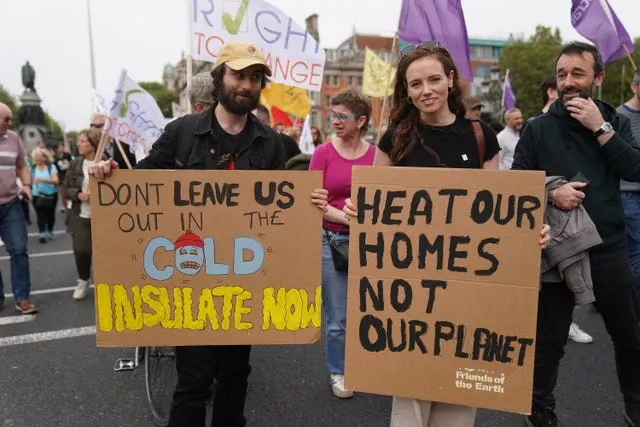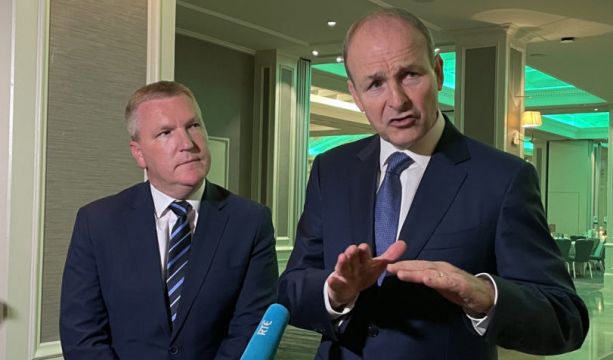Minister for Finance Michael McGrath has said that their budgetary plans aim to improve people’s living standards.
Mr McGrath also said that the drop in corporation tax receipts is “no cause for panic”, but did signal the Government needed to make the most of the billions in revenue “quickly”.
The Fianna Fáil TD was speaking alongside his party leader, Tánaiste Micheál Martin, at a party event in Dublin ahead of the budget on Tuesday.
Government figures have said that details still need to be finalised, with a meeting expected between the coalition party leaders, Mr McGrath and Public Expenditure Minister Paschal Donohoe on Sunday.
Mr Martin said that population growth over a short space of time had resulted in pressure on public services like health, education and childcare.
Continuing to work on #Budget2024 this weekend. I’m so grateful for the fantastic team of public servants I have supporting me in my work. It wouldn’t be possible without them. pic.twitter.com/BMx0xtDSXk
— Michael McGrath (@mmcgrathtd) October 7, 2023
He also said that energy bills were “clearly still an issue” for many households.
“It was more severe last year, but it still is a significant issue and we want to get people through the winter.
“So the specifics I won’t be announcing now, that’s to be discussed again over the weekend, the actual specifics of the cost-of-living package.”
Mr McGrath said it would be odd not to be nervous as he prepares to present his first budget on Tuesday.
“You just want it to go well, but first and foremost you want it to have the desired effect,” he said.
“We know that a lot of people are genuinely hurting. The truth is that it’s a mixed picture, and many people have been able to absorb the cost-of-living increases with a degree of comfort, but for others, it has put them on a real strain.
With #Budget2024 just a few days away, Minister for Finance @mmcgrathtd outlines the key priorities for Fianna Fáil:
🟢 Easing the cost of living
🟢 Housing for all
🟢 Investing in public services
🟢 Supporting indigenous business
🟢 Providing for the future pic.twitter.com/v94w20HvQHAdvertisement— Fianna Fáil (@fiannafailparty) October 4, 2023
“And I think when you look at the big picture, and over the last 12 to 18 months, some people have had a deterioration in their living standards because their income hasn’t increased in line with inflation.
“I do believe that that is about to change. And I think what we will lay out on Budget day is our plans in both tax and expenditure but, more broadly, an expectation and an optimism that living standards are about to improve for people, that incomes will rise ahead of the rate of inflation, that people will make gains in real terms and their life will be better.
“And I think that is fundamentally what we will be laying out on Budget day.”
Earlier on Saturday, hundreds of people marched through Dublin city centre to call for the Government to act on housing, the cost of living and workers’ wages.
Many at the protest called for wages to be increased and for a rent cap or freeze to be introduced.
Several parents said they were managing amid inflated grocery and electricity prices, but expressed concern for their children’s ability to be able to pay their rent or to buy a home.

A large number of third-level students attended the demonstration, including around 30 students from University of Limerick who got a bus up to the capital to take part in the protest.
The march, organised by the Cost of Living Coalition, started at Parnell Square and ended at Leinster House, where speakers addressed the crowd.
Those who took part chanted “Out, Out Out” to the names of coalition party leaders Taoiseach Leo Varadkar, Tánaiste Micheál Martin and Green Party Leader Eamon Ryan.
“The students are definitely rising,” People Before Profit TD Richard Boyd Barrett told the crowd as it gathered to hear speeches in front of the gates of Leinster House.
Edana Flynn, Postgraduate Students’ Union vice president at the University of Limerick (UL), said that not being able to afford basic goods was an issue that has been “creeping up over the last four years for students and researchers”.

She said that rent freezes and caps were needed and food prices needed to go down, and that students were “angry”.
She added: “We offer free cereal in our student common room and some students are not eating, post grads are not eating, these guys have tutorials they have to go to and they can’t afford food because they’re paying through the nose for their rent.
“Students can’t afford rent, researchers can’t afford to live on €7.80 an hour – and even then it can be considerably lower from faculty to faculty – we’ve just had enough.
“We’re seeing our students day in, day out they’re struggling to get part-time work, they’re struggling to commute. Students and researchers are not living, they’re surviving.”
Cathy Fagan, who works in St Michael’s Family Resource Centre in Inchicore, said that things were “getting really hard”.

She added: “We’re just struggling as mammies and as women and everything is going up and we’re not getting enough pay, the wages aren’t equal.
“My daughter had to move to Mullingar from Dublin because the rent is mad here.
“It’s bigger than what’s in the Budget – just to be able to not worry day to day. Some days it’s ‘do you put your heating on or do you have your bit of food?’ It can be like that for some people, especially older people.”
James Duggan said there needed to be secure tenancies for people, and said he has two children living in Dublin and does not know how they will be able to afford a home in the capital.
Roisin McAleer, a single parent and a teacher based in Dublin, said that the scarcity of teachers is directly linked to the housing crisis.

When asked how she is handling an increase in prices, she said “not very well, I’m very nervous and very careful”, but added that the issues were “wider than the Budget” and not only down to housing and energy costs.
“It was hard enough 30 years ago when I was starting out… There’s an illusion if you’re in a profession that you’re safe enough,” she said.
Theresa Johnson, from Clonmel in Co Tipperary, said that social welfare and disability payments needed to be increased dramatically to match the rate of increase.
“I speak to families on a daily basis who can’t afford to put a breakfast on the table for some of their children.
“They go to a school to a breakfast club to try to save money,” she said.

“The government should be calling an emergency housing crisis… They can put a cap on high rents, people are struggling with high rents.”
The coalition is made up of various representative groups such as the Union of Students in Ireland, the Dublin Council of Trade Unions, the Irish Senior Citizens Parliament, Inclusion Ireland and Extinction Rebellion.
People Before Profit, the Social Democrats and Right2Change took part in Saturday’s protest.
Recent figures show that inflation in Ireland has not fallen to the levels forecast at the start of the year.
The Consumer Price Index rose by 6.3 per cent in the 12 months to August this year, up from 5.8 per cent in the 12 months to July.







